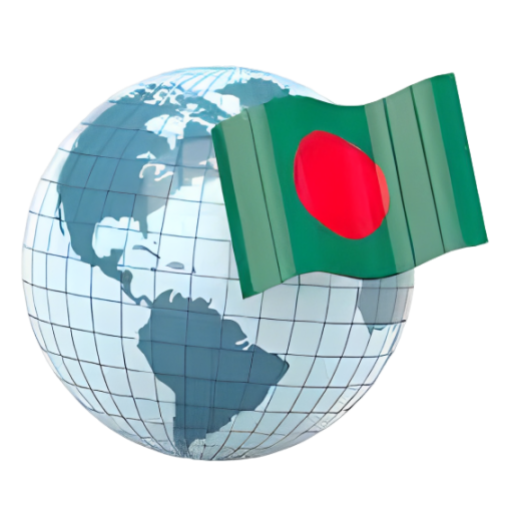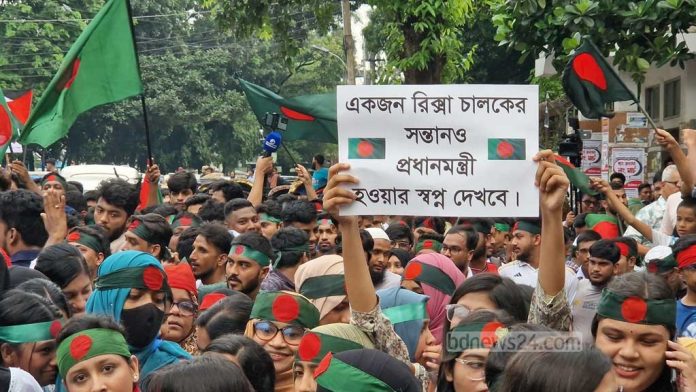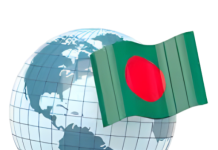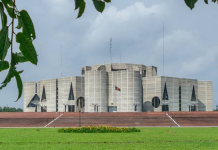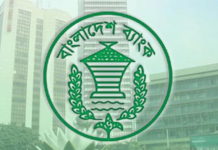Bangladesh is passing through a tumultuous time. The student-led mass uprising, now variously called ‘second liberation’, ‘rebirth’ or ‘natun’ (new) Bangladesh, parallels the Arab Springs that witnessed toppling of such entrenched authoritarian regimes in Tunisia and Egypt in 2010-2011. What began as a student movement against the discriminatory quota system quickly turned into a popular uprising against Sheikh Hasina’s autocratic regime and the country’s security forces, ultimately forcing Sheikh Hasina to flee the country on 5th August 2024 for refuge in India. This high magnitude political earthquake indeed signals strong tremors of long-held political and economic grievances by the people of Bangladesh.

The mass uprising has truly been a socio-political awakening unrivalled in the history of Bangladesh since 1971. The former Prime Minister, breaking silence after her ouster, claimed ‘foreign hand’ behind the political crisis and accused the US for plotting her departure. She further warned the Interim government not to be ‘used’ by such foreign powers. It is hard to judge such claim despite common knowledge that Sheikh Hasina’s government had ‘strained relationship’ with the US for many years. The mass revolution is just over a month old; thousands of students, workers, and masses lost their lives in the bloody struggles. The law and order situation has improved in the post-revolution era, but it is still not to back normalcy. The political drama is perhaps still unfolding, with hints of discontents in the armed forces, to emerge full circle in the coming days.
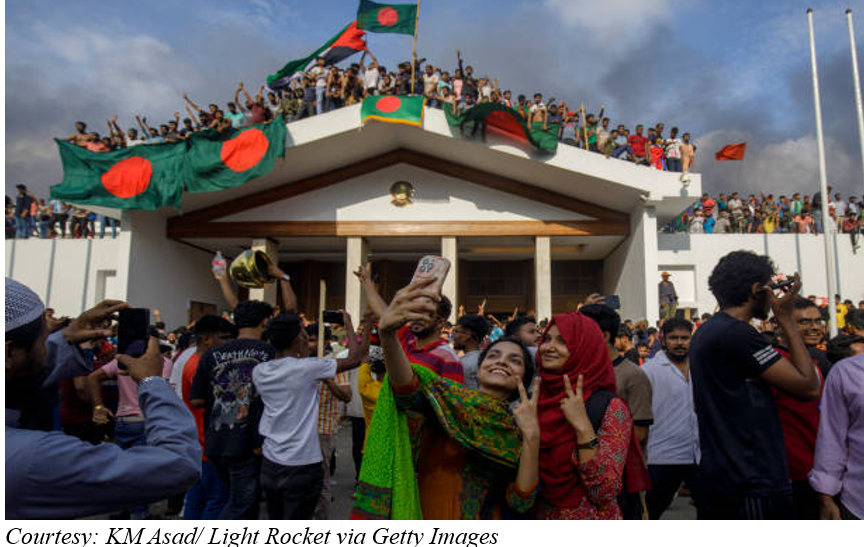
Meanwhile, the student leaders of the Anti-Discrimination Movement (ADM) has formed an interim government led by Noble laurate Dr. Muhammad Yunus with the hope to usher a new era for the country. The global response to the transition in Bangladesh has been largely positive – for instance, countries like Canada, India, UK, US, and international bodies such as EU and UN have expressed their readiness to work with the Interim government and its chief Dr. Yunus. This surely is a good news for the new interim government.
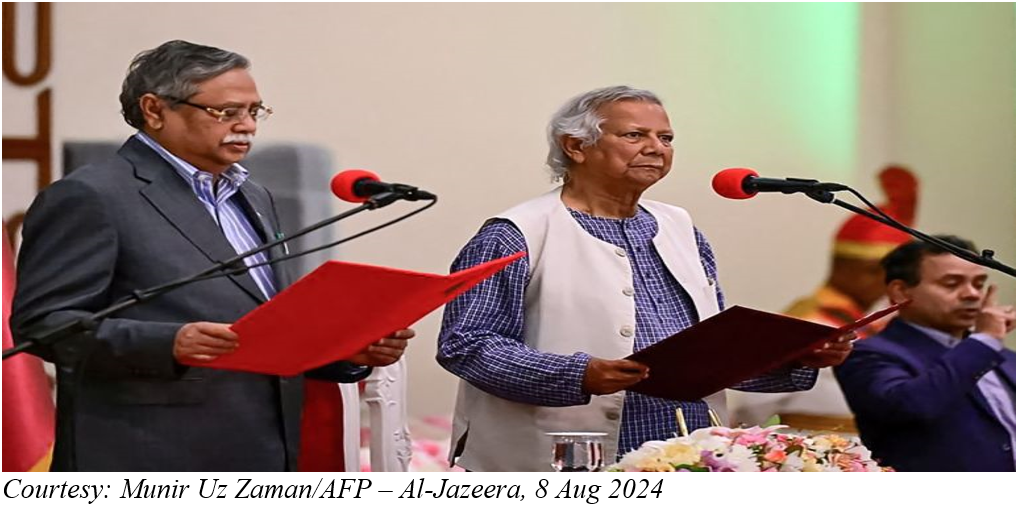
With swearing-in of the new Interim government, the ADM leaders have now entered, what one analyst calls, a ‘social contract’ with the people aspiring to build a Natun Bangladesh out of the ‘blackhole of despotism and tyranny’ of the past government. The ADM movement has raised important social and political issues to redress – for instance, reforming administration and many key critical state institutions such as the judiciary, police, election commission, human rights and anti-corruption commissions. Moving forward, reforms and strengthening of these institutions are of utmost urgency for any transition to democracy.
For now, as it appears, the mandate of the interim government is to ensure a peaceful transition to democracy, meaning holding fair elections and transfer of power to the elected government. The timeline for such transition is yet undetermined. Both Dr. Yunus and the ADM leaders are of the opinion that it will take time to ‘fix the broken system’ and to establish a conducive environment for fair election. Therefore, they are not bound by any timeline now.
Bangladesh needs a major overhaul in its governance systems and institution building for good governance and accountability. Unlike the past Caretaker governments meant for election purposes, the Interim government must be viewed differently and be given the needed time to deliver. The constitutional experts in the country are already making this difference. The expectation is very high; any failure to reform for a just society could bring back the chaos and set back the clock.
The old model of political leadership with family dynasty, cronyism, and corruption must end in order to dawn a new future for the country. ‘Politics as usual will waste the victory’ of the people, said one analyst. The parties and political leaders, who are vying for power, must respect the spirit of the students and mass movement and the need for fundamental reforms of government institutions, including judiciary, police, and overhaul the public administration system, making it accountable to the people.
The country and the interim government are riding on high hopes for reforms and have already appointed several reform commissions. However, it must be admitted that some of the appointments are being questioned, including in key regulatory institutions and administrative posts for their links with the fallen regime. More diligence and wider dialogues are needed to avoid missteps and disappointments.
And there are still others who warn ‘chaos’ in the country ‘without swift’ polls. These political leaders and faces are already known and tested, who are indeed responsible for inflicting destruction and turmoil in the country.

As seen in the past, elections are not the ‘cure for all’ ills in the country or remedy for all hurdles ahead. Right now, what the country needs is stability, law and order, improved opportunities for living and livelihoods and security. It may still take months to restore and perhaps years to create an environment conducive for election. The timeline should be left to the Interim government and ADM leaders to define in order to reform and reconstitute political and economic institutions for a better tomorrow. The critical reforms must correct the misrule of the last 15 years in all sectors in the country.
There is no other choice. The fall of an undemocratic and autocratic regime should not give rise to another similar experience in the future. The country is not ready to see the same old game by the same political leaders with a rotating set of players. There should be real alternative choices in the next election. This can truly happen with major overhauling of key institutions and system of governance for a just, equitable and democratic future of the country.
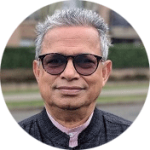
Mohammad Zaman
Dr. Mohammad Zaman is an internationally known development/ resettlement specialist. He has worked in many major projects for the World Bank in Bangladesh and in other countries in Asia and Africa. Dr. Zaman’s most recent edited book (co-editor Mustafa Alam) is titled Living on the Edge: Char Dwellers in Bangladesh, Springer, 2021. E-mail: mqzaman.bc@gmail.com
